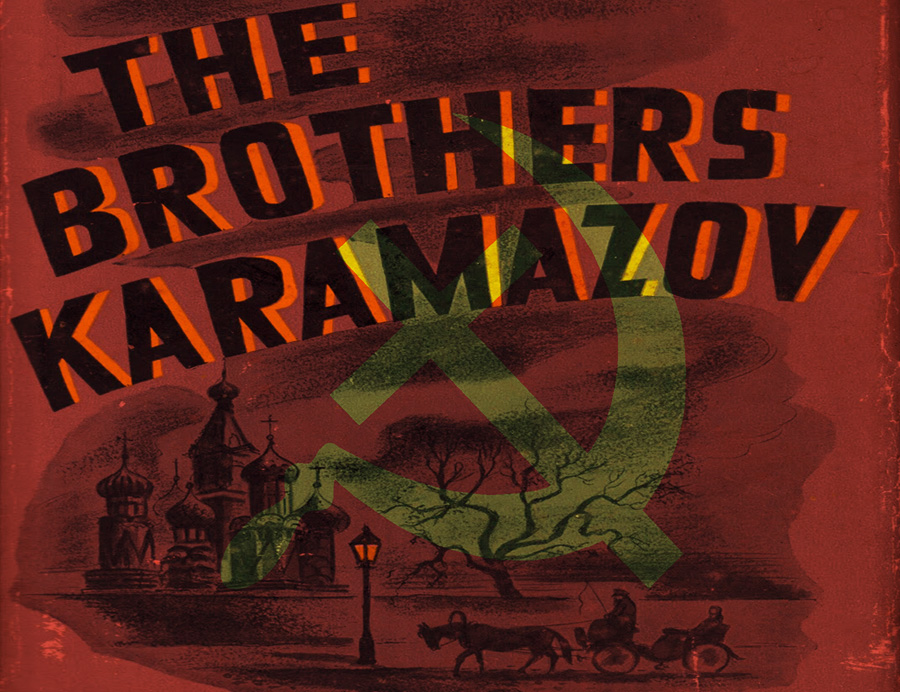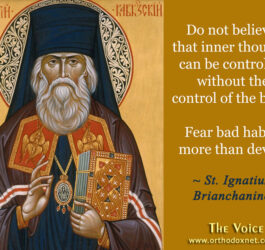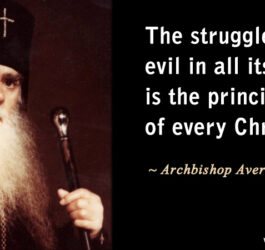 by Chris Banescu –
by Chris Banescu –
“The socialist who is a Christian is more to be feared than the socialist who is an atheist.” ~ Fyodor Dostoevsky
A sober warning comes to us from the writings of Fyodor Dostoevsky in his book The Brothers Karamazov. Given that some Orthodox Christian leaders today embrace and promote socialist ideas, this ominous observation should give us pause. Is history repeating itself?
“We are not particularly afraid of all these socialists, anarchists, atheists and revolutionaries…. But there are a few peculiar men among them who believe in God and are Christians, but at the same time are socialists. Those are the people we are most afraid of. They are terrible people! The socialist who is a Christian is more to be feared than the socialist who is an atheist.” ~ Fyodor Dostoevsky (Fedor Dostoevskii), The Brothers Karamazov
I located this translated quote in the opening pages of the book Red Priests: Renovationism, Russian Orthodoxy, and Revolution, 1905-1946, written by Edward E. Roslof. When looking up the exact wording in the The Brothers Karamazov book by Dostoevsky, a slightly different translation used the term “dreaded” instead of “feared” when referring to Christian socialists.
Here is the relevant excerpt from The Brothers Karamazov book for reference (paragraph breaks and emphasis mine).
“Allow me to tell you one little anecdote, gentlemen,” Miusov said impressively, with a peculiarly majestic air. “Some years ago, soon after the coup d’etat of December, I happened to be calling in Paris on an extremely influential personage in the Government, and I met a very interesting man in his house. This individual was not precisely a detective but was a sort of superintendent of a whole regiment of political detectives — a rather powerful position in its own way. I was prompted by curiosity to seize the opportunity of conversation with him. And as he had not come as a visitor but as a subordinate official bringing a special report, and as he saw the reception given me by his chief, he deigned to speak with some openness, to a certain extent only, of course. He was rather courteous than open, as Frenchmen know how to be courteous, especially to a foreigner. But I thoroughly understood him.
The subject was the socialist revolutionaries who were at that time persecuted. I will quote only one most curious remark dropped by this person. ‘We are not particularly afraid,’ said he, ‘of all these socialists, anarchists, infidels, and revolutionists; we keep watch on them and know all their goings on. But there are a few peculiar men among them who believe in God and are Christians, but at the same time are socialists. These are the people we are most afraid of. They are dreadful people. The socialist who is a Christian is more to be dreaded than a socialist who is an atheist.’ The words struck me at the time, and now they have suddenly come back to me here, gentlemen.”
~ Fyodor Dostoevsky (The Brothers Karamazov)
Part I. Book II: An Unfortunate Gathering
Chapter 5: So Be It! So Be It!




Paging Rob Bell, Shane Claiborne, Brian McLaren, Doug Pagitt, Tony Campolo, Jim Wallis, C. Peter Wagner, et al.
We have a different ideological poison here. In America, it’s the Christian who is a Libertarian who is to be feared.
Fear the Libertarian…why?
Out of fear that they might reduce government totalitarianism? That’s really what you are seeing right now in the streets? The last decades of America suggest Libertarians have been causing the problems that give us today San Francisco or Seattle or Chicago?
Fear Basil & John ?
Basil of Caesarea (c. 330-379), the patriarch of the Eastern monks who became Bishop of Caesarea, established a complex around the church and monastery that included hostels, almshouses, and hospitals for infectious diseases.[14] During the great famine of 368, Basil denounced against profiteers and the indifferent rich. Basil wrote the sermon on The Rich Fool in which he states:
Who is the covetous man? One for whom plenty is not enough. Who is the defrauder? One who takes away what belongs to everyone. And are not you covetous, are you not a defrauder, when you keep for private use what you were given for distribution? When some one strips a man of his clothes we call him a thief. And one who might clothe the naked and does not—should not he be given the same name? The bread in your hoard belongs to the hungry; the cloak in your wardrobe belongs to the naked; the shoes you let rot belong to the barefoot; the money in your vaults belongs to the destitute. All you might help and do not—to all these you are doing wrong
—Basil of Caesarea from the The Rich Fool.
John Chrysostom declared his reasons for his attitude towards the rich and position of attitude towards wealth by saying:
I am often reproached for continually attacking the rich. Yes, because the rich are continually attacking the poor. But those I attack are not the rich as such, only those who misuse their wealth. I point out constantly that those I accuse are not the rich, but the rapacious; wealth is one thing, covetousness another. Learn to distinguish.
—John Chrysostom.
There is an enormous moral and theological chasm between VOLUNTARY vs. FORCED charity. Christianity calls for us to voluntarily help the poor, the needy, and loving our neighbor. This is where the virtue comes in and man shows himself a true follower of Christ. Individual voluntary giving and charity is what these great saints of the Church exhorted and emphasized. This is NOT what socialism and communism require.
Socialism and communism (fruits of the same evil tree) are immoral, unjust, and tyrannical at their very foundations. They demand forced confiscation (under the threat of imprisonment or death) of the fruits of one’s labor and arbitrary redistribution to those the political elites deem “worthy” (including the elites themselves, their families, and their cronies) of the government’s largess. There is no virtue or justice. Socialism and communism while borrowing the Christian language and justifying it via the same moral imperatives enforce it subjectively, often via unjust, punitive, and unfair means.
These ideologies are based on hatred of other, greed, and covetousness. They glaringly violate two of the Ten Commandments: (1) You shall not steal. and (2) You shall not covet your neighbor’s house; you shall not covet your neighbor’s wife, nor his male servant, nor his female servant, nor his ox, nor his donkey, nor anything that is your neighbor’s.
As Fr. John Whiteford, an Orthodox Christian priest, so rightly observed: